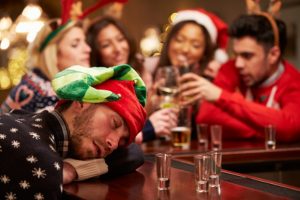 Binge drinking is more likely during holidays and may harm your brain. Alcohol seems to go hand-in-hand with the festivities, and as many of us gather to celebrate, it seems that drinking (often excessive) is an inevitable part of any holiday party.
Binge drinking is more likely during holidays and may harm your brain. Alcohol seems to go hand-in-hand with the festivities, and as many of us gather to celebrate, it seems that drinking (often excessive) is an inevitable part of any holiday party.
Research has shown that after two glasses of wine the brain becomes activated through complex neurobiochemical processes that naturally release dopamine – the feel-good hormone. When its molecules lock on to their receptors on the surface of brain cells, the feel-good buzz occurs. However, those who drink beyond the buzz run the risk of intoxication and trouble.
Advertisement
Alcohol contributes to over 88,000 deaths annually, which is double the number of heroin or opioids overdose cases.
Alcohol doesn’t just affect the drinker, it can have an impact on friends and family, too, as their addiction grows and behavior becomes more and more out of control. Friends and family may not fully understand the effects of alcohol on the drinker, but research has shown binge drinking is, in fact, a medical condition resulting from a malfunction of the pleasure circuit in the brain. As a result, the drinker desires more and more alcohol, often beyond their will.
Americans are more than willing to make necessary lifestyle changes to address their other unhealthy behaviors, but this is not always the case when it comes to alcohol abuse.
This is why researchers are working tirelessly to develop methods of alcoholism and binge drinking prevention. In order to do that, though, there needs to be a comprehensive understanding of this alcohol disorder.
Alcohol addiction develops in three phases: binge-intoxication, withdrawal-negative affect, and preoccupation-anticipation. It begins in the neurons that are organized in clusters to form networks for completing certain functions. The addiction cycle causes dysfunctions in some key areas of the brain, consequentially enabling alcohol triggers that make you seek more alcohol.
The brains of binge drinkers react to alcohol with the feeling of intense pleasure, which becomes an incentive to keep drinking. Alcohol withdrawal in this case results in negative emotional state, further driving the drinker to seek out alcohol to make themselves feel good again.
The good news is, there are medications available for treating alcohol addiction, along with behavioral therapies which can help improve treatment – for example, group therapies.
Advertisement
It is important for family and friends to approach this issue with understanding, as this is something that your loved one cannot control.
To help the person suffering from alcohol addiction, avoid situations where alcohol is present and consider having alcohol-free parties where everyone abstains from drinking. You can still have a great time celebrating the holidays without alcohol – in fact, you may find you have a better time because your guests aren’t drunk.
Related: The health benefit of alcohol you didn’t know about
